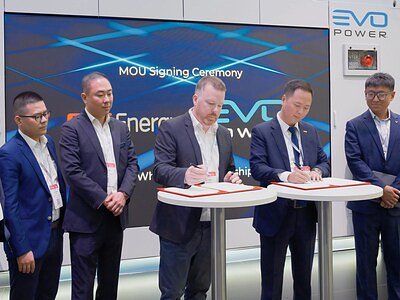
Australia’s Energy Storage Boost: EVE & EVO Deal Signals New Era for Renewables
A major partnership between Chinese battery giant EVE Energy and Australian firm EVO Power is set to inject 2.2GWh of energy storage into the Australian grid, accelerating the nation’s renewable energy transition and reshaping the competitive landscape.
Australia’s Energy Storage Boost: EVE & EVO Deal Signals New Era for Renewables
By Stephanie Kelly
Australia is poised for a significant leap forward in its renewable energy ambitions with a newly forged partnership between Chinese battery manufacturer EVE Energy and Australian energy company EVO Power. The agreement, announced this week, will see EVE Energy supply 2.2 gigawatt-hours (GWh) of large-scale energy storage systems over the next five years, bolstering grid stability and accelerating the integration of renewable energy sources across the country.
While the deal represents a win for both companies, industry analysts say it signals a broader shift in the Australian energy landscape – one characterized by increasing competition, technological innovation, and a growing focus on affordable and reliable energy storage solutions.
Technological Edge & Market Disruption
At the heart of the partnership are EVE Energy’s ‘Mr.Big’ and ‘Mr.Giant’ battery systems. The Mr.Big is a high-capacity energy storage cell, while the Mr.Giant is a simplified, 5MWh DC container solution integrating the Mr.Big batteries. EVE Energy claims to be a leader in large battery innovation, having been the first to mass-produce the 628Ah Mr.Big cell.
“The technology is undeniably impressive,” says one energy storage consultant, speaking anonymously. “The Mr.Giant system’s modular design and ease of deployment offer significant advantages, particularly in a market like Australia, where geographical challenges and diverse energy needs require flexible solutions.”
EVE Energy’s decision to establish an Australian subsidiary and a Malaysia production base further demonstrates its commitment to the region. The Malaysia facility, slated to be fully operational by Q1 2026, will enhance supply capacity and ensure timely delivery of systems to the Australian market.
Strategic Expansion and Geopolitical Context
The partnership comes at a time of increasing global demand for energy storage, driven by the rapid growth of renewable energy and the need for more resilient and reliable power grids. For EVE Energy, the Australian market presents a significant opportunity for expansion and diversification.
“Australia is a key renewable energy market, with ambitious targets for decarbonization and a supportive regulatory environment,” explains an industry analyst. “EVE Energy is strategically positioning itself to capitalize on this growth, leveraging its technological expertise and competitive pricing.”
The deal also carries geopolitical implications, occurring within the broader context of China-Australia relations. While diplomatic tensions have eased recently, the partnership demonstrates a continued level of economic cooperation between the two countries.
Competition Heats Up in Australian Energy Storage Market
The arrival of EVE Energy is set to intensify competition in the Australian energy storage market, currently dominated by players such as Tesla, Fluence, and Wärtsilä.
“This deal will undoubtedly put pressure on existing players to innovate and reduce costs,” says another industry source. “The increased competition will ultimately benefit consumers by driving down energy prices and improving the reliability of the grid.”
Tesla remains a major force, with its Powerpack and Powerwall systems already widely deployed across Australia. Fluence offers integrated energy storage solutions, while Wärtsilä provides advanced energy management systems. These companies are now facing a new competitor with significant technological capabilities and a strong commitment to the market.
“The fact that EVE Energy is investing in local infrastructure, including the production facility in Malaysia, is a significant differentiator,” points out one analyst. “It demonstrates a long-term commitment to the Australian market and will allow them to respond quickly to changing customer needs.”
Benefits for Local Communities and Grid Stability
The partnership is expected to bring several benefits to local communities across Australia. The increased availability of energy storage will help to stabilize the grid, reduce reliance on fossil fuels, and create new jobs in the renewable energy sector.
“Energy storage is crucial for managing the intermittency of renewable energy sources like solar and wind,” explains an energy expert. “By providing a buffer between supply and demand, it helps to ensure a reliable and affordable power supply for homes and businesses.”
The partnership will also contribute to Australia's broader decarbonization goals. By enabling the integration of more renewable energy into the grid, it will help to reduce greenhouse gas emissions and combat climate change.
Looking Ahead
The EVE Energy and EVO Power partnership represents a significant step forward for the Australian energy storage market. It underscores the growing importance of energy storage in enabling a sustainable and resilient energy future.
As the demand for renewable energy continues to grow, and as battery technology continues to advance, we can expect to see even more innovation and investment in this critical sector. The arrival of EVE Energy is a clear signal that the Australian energy landscape is undergoing a profound transformation, and that the future of energy is looking brighter than ever.
Ultimately, the success of this partnership will depend on a number of factors, including the ability to navigate regulatory hurdles, secure financing, and deliver projects on time and within budget. However, with its strong technological capabilities, strategic vision, and commitment to the Australian market, EVE Energy is well-positioned to play a leading role in shaping the future of energy in Australia.
